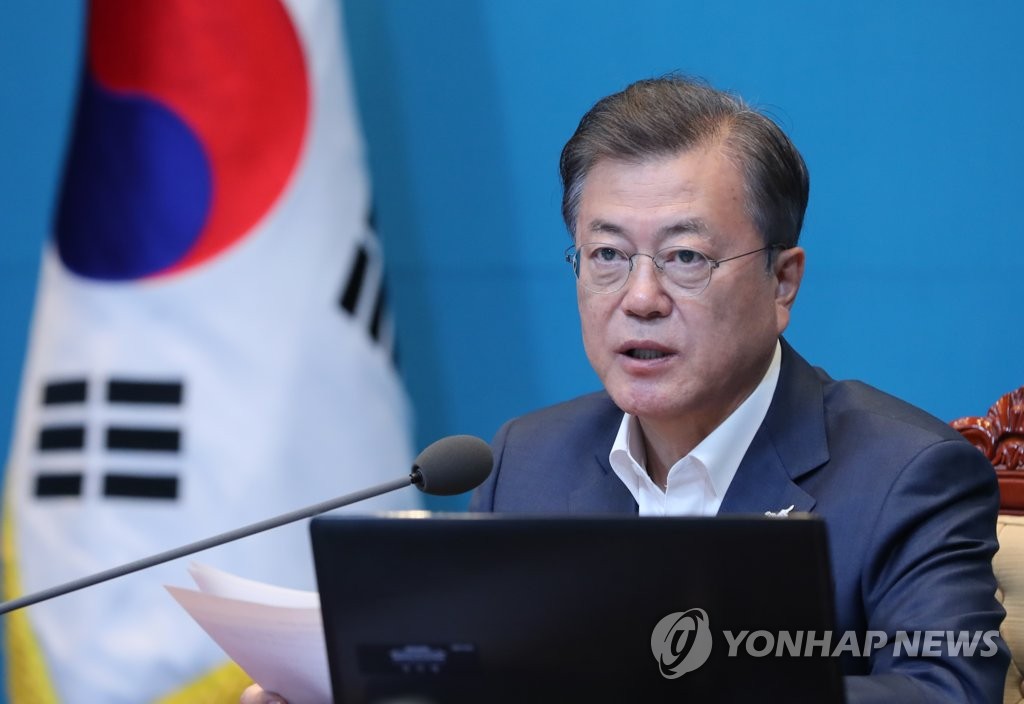- S. Korea unveils first graphic cigarette warnings
- US joins with South Korea, Japan in bid to deter North Korea
- LPGA golfer Chun In-gee finally back in action
- S. Korea won’t be top seed in final World Cup qualification round
- US men’s soccer misses 2nd straight Olympics
- US back on track in qualifying with 4-0 win over Guatemala
- High-intensity workout injuries spawn cottage industry
- CDC expands range of Zika mosquitoes into parts of Northeast
- Who knew? ‘The Walking Dead’ is helping families connect
- California Assembly OKs highest minimum wage in nation
Moon says S. Korea to seek ‘realistic, practical’ ways for inter-Korean ties
President Moon Jae-in said Monday his government will move ahead with “realistic and practical” cooperation with North Korea despite international constraints, holding out expectations for a fresh breakthrough in the coronavirus pandemic.
He was apparently referring to U.N.-led sanctions on Pyongyang as he spoke on the occasion of the second anniversary of his historic Panmunjom summit with North Korean leader Kim Jong-un.
Moon stressed that South Korea won’t sit idle until the external conditions improve, with the Pyongyang-Washington denuclearization talks in a drawn-out stalemate.
“(We) will explore the most realistic and practical ways for South-North cooperation,” he said during a weekly meeting with his senior Cheong Wa Dae aides.
Moon said the COVID-19 crisis could provide the two Koreas with a new opportunity for bilateral partnerships.
“For now, it’s the most urgent and desperate task,” he said. “South and North constitute a single life community, which would serve as the foundation for moving toward a peace community.”

President Moon Jae-in speaks at a meeting with his senior aides at Cheong Wa Dae in Seoul on April 27, 2020. (Yonhap)
Beginning with anti-coronavirus efforts, the two sides would be able to work together to cope with infectious diseases in animals, disasters in border areas and climate change, Moon added.
He also said South Korea will do what it can in connection with the project to relink inter-Korean railways.
Earlier in the day, Seoul’s unification ministry in charge of Pyongyang affairs, held its own symbolic ceremony to reaffirm a commitment to the project to modernize and reconnect a pair of railroads across the Demilitarized Zone (DMZ).
The North has long been subjected to tough sanctions for its nuclear and missile tests. The South plans to prioritize resuming inter-Korean programs that would not undermine the sanctions or getting conditional exemptions.
The Moon administration spent most of last year waiting for a tangible outcome from Pyongyang-Washington dialogue, to no avail.
Moon’s remarks reflect his resolve to get inter-Korean cooperation back on track and help move forward nuclear negotiations, though it depends on the unpredictable communist neighbor’s attitude.
He recalled the moment of briefly stepping over the Military Demarcation Line into the North together with Kim two years earlier. Their first-ever summit took place at the DMZ truce village of Panmunjom, leading to a joint statement on a concerted campaign to bring lasting peace on the peninsula.
“The Panmunjom Declaration open the door of irreversible peace,” but the past two years have shown that peace won’t be achieved overnight, Moon said.
Little progress so far in implementing the summit accord is not due to the lack of the two Koreas’ commitment to actions but because of a failure to overcome the existing international restrictions, he said
“We can’t just wait for the conditions to improve,” Moon stressed. “We must continue to do even small things that we can do amid realistic constraints.”
As soon as the coronavirus is brought under control, Seoul plans to push for the reunification of families living on the other side of the DMZ, and the two sides should continue the joint war remains excavation project, he said.
Moon also reaffirmed a push to turn the DMZ into a global peace zone, noting that this year marks the 70th anniversary of the outbreak of the Korean War.
He made no comments on media-driven speculation that the North Korean leader, who has gone out of public view for more than two weeks, seems to be critically ill.












